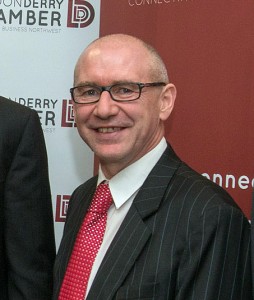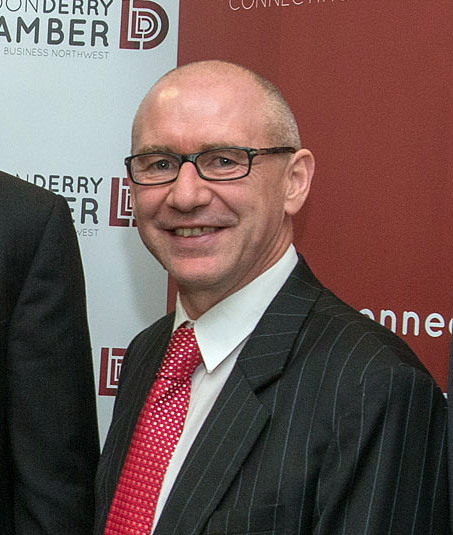 by Gerry Kindlon, vice president Derry Chamber of Commerce
by Gerry Kindlon, vice president Derry Chamber of Commerce
Some recent news stories should make us focus more clearly on what the modern world of work means for people in Derry.
About a thousand people in the city applied for just 30 jobs at a new local restaurant.
This is a clear reflection on Derry’s unwanted status as the UK’s capital of unemployment – we have the country’s highest rate.
So what should we in Derry do about this? I made several suggestions and explanations when I was given the honour of being invited to address the most recent British-Irish Assembly.
First things first. If you want to get anywhere, have a plan and know your route. Derry has a plan – the One Plan.
Whilst supporting the One Plan, I recognise that it needs to be more flexible and adaptable. The rapid change in technology and the market dictates this. Across the board we need to speed up our decision-making.
But the principles behind the One Plan are sound. That plan aims to create 12,900 jobs in the city, making us a vibrant economic hub.
So let us make demands of our politicians and other decision-makers that they implement a flexible One Plan.
We also have to recognise the context in which the modern world of work operates.
We are in a digital universe, in which the whole world exists as almost a single market. That is the reality of globalisation.
However, to paraphrase a former UK prime minister, success in that modern, digital, globalised environment comes down to three decisive factors.
Those are skills, skills and skills!
Above all, those skills most be attuned to operate digitally and globally. They have to reflect the modern workplace, which in the future is perhaps as likely to be in your own home as in a traditional office.
Here people in Derry have a significant advantage and opportunity – we have what is arguably Europe’s best high speed broadband infrastructure.
Today’s computing environment brings together four key ingredients.
One of these is cloud computing – which, for the uninitiated, is storage and access via an external data centre.
Along with cloud computing, the other factors are mobile technologies, social media and, of course, the supply of information. Bringing all these together are people, providing they have the skills to do so.
As a package, this represents a data revolution – the era of what is often called ‘Big Data’. Increasingly the decisions taken for us, the decisions taken by us and the supply of information presented to us will all be based around this data revolution.
The amount of data generated, stored, replicated and consumed is multiplying massively – it is expected to expand by a factor of 40 during the course of the current decade, with no sign of slowing down.
Meanwhile, the use of mobile technologies is going through a comparable massive increase.
Consumers are shifting their computing habits onto mobile technologies, using smart phones and tablets. By the end of the decade that process will be enhanced with an even greater use of cloud technologies, relieving the need for mobile devices to store information.
All businesses and public bodies will need to respond to these changes by having a strategy – in particular to deal with the cloud and in their use of Big Data.
Similarly, those in work and those seeking work either today or in the future will need to develop their personal strategies to deal with these changes and ensure they have the necessary skills.
Where people talk today about ICT, in the future the focus will be on computer science. It will not be enough to know how to use a computer, it will be just as important to write code. The STEM – science, technology, engineering and maths – subjects will become even more essential.
But as the recent international PISA comparisons prove, we in Northern Ireland need to up our game in terms of educational outcomes.
We need to educate differently in the modern world, focusing more of promoting pupils to think more and to solve problems.
Education has to be about enquiry-based learning to provide the skills and attitude needed in the new world of work.
As with any profound challenge, there are dangers alongside opportunities.
There is no longer such a thing as a job for life.
Risk takers will find that it becomes easier to start their own businesses, though many of those firms will fail. Existing businesses will find it becomes easier to relocate – not just to where it is cheaper, but also where the quality of life is better.
Here, again, Derry has a major opportunity.
Derry has an opportunity to be a leader in the application of digital technologies, along with data analysis.
And our Western European time zone presents an advantage in a globalised world. We can talk to most of the world at some point in our working day.
So what does all this mean in terms of potential sectoral strength for Derry and the rest of Ireland?
In my opinion our greatest opportunities lie with software and the creative industries.
In addition, through intelligent use of data and information, we can also compete in alternative energy sources, tourism, agri-food, healthcare and biotechnology.
If we exploit our capabilities and potential we can have a great future. But to move from a city with the UK’s highest rate of unemployment to one that can prosper does involve a great leap forward.
And that journey begins with a plan. So let’s recommit to the One Plan, while encouraging all our current and future workers to think about their personal plans.
Gerry Kindlon will become president of Derry Chamber of Commerce next month
Tags:





